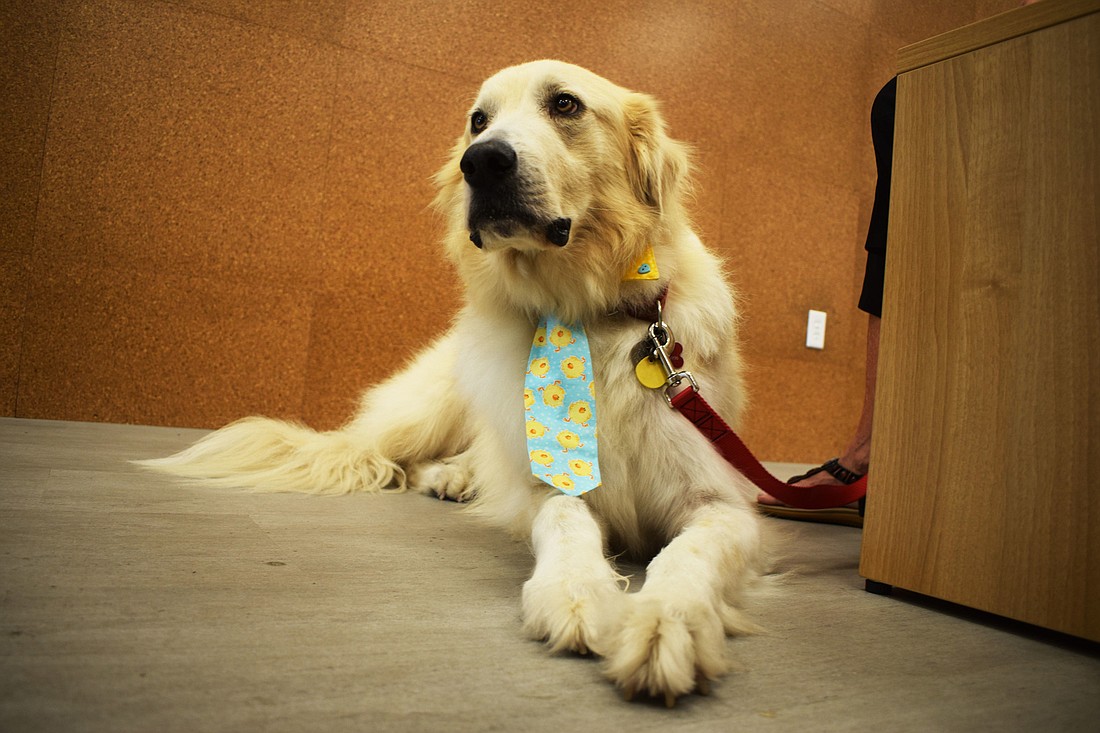- July 26, 2024
-
-
Loading

Loading

Greenbrook’s Allison Rothhaar was nervous walking into Lakewood Ranch Endodontics in February.
She has had a lot of dental work done in the past and was unsure about her appointment.
But then a small Pomeranian came up to her and sensed the tension.
As Rothhaar sat on the dentist’s chair, the Pomeranian sat quietly in her lap, and she spent some time petting the pup.
“My daughter was laughing at the little one’s playful antics,” said Crystal Rothhaar, Allison’s mother. “It took the fear out of it. She has high anxiety at the dentist because she’s had a lot of dental work, but she was totally fine.”
More and more often dogs are being used to calm people and alleviate anxieties as therapy animals, and therapy animals are becoming more commonplace among schools, businesses and organizations.
Denise Schonwald, the owner of a therapy practice, has been using therapy animals in her practice for four years. She had a cockapoo named Max staying in her office with her to help clients through their sessions. Now she has a new dog, Henry, to keep her clients company.
“I feel like animals are intuitive,” Schonwald said. “Therapy can be traumatic, and people are often coming in hesitant and fearful. I think having a dog helps them feel more comfortable going through some heavy subject matter or problems. It certainly helps alleviate a little bit of that anxiety.”
Schonwald said that if her clients are crying or upset, Henry will get his toy and bring it to them, which gives them a sense of peace and comfort.
Ginny Armington, the director of community outreach for the Humane Society of Sarasota County, said the nonprofit’s pet therapy program has about 80 volunteers who would go to elementary schools, colleges, assisted living facilities, nursing homes, hospitals and other organizations and businesses to provide pet therapy services.
“Research has shown your heart rate goes down and your blood pressure goes down when you’re petting an animal,” Armington said. “There’s just something soothing about petting a dog or even a cat. It actually affects us physiologically. … Dogs don’t judge you. They love everybody. They love you for who you are. I think that makes a difference.”
Armington has seen patients with dementia who are completely unresponsive light up when the therapy dogs come to visit.
Nan Miller, a volunteer for the Humane Society of Sarasota County’s pet therapy program, brings her golden retriever, Lance, with her wherever she goes. Lance has a sweet, calming demeanor.
While working with veterans, Miller said Lance has inspired some veterans to get emotional support dogs to help them.
Miller said she was in Bayfront Park one day with Lance when a veteran approached her and reminded her of a time she visited the Sarasota VA Clinic and Lance laid down on his feet, and he started to pet Lance.
“He said, ‘You changed my life,’” Miller said. “He said, ‘I have PTSD, and for the longest time, I wouldn’t leave my house except once a week with $20 to go to the grocery store and run home again. I was shot, and I knew I needed to get a dog. … Now I go everywhere with that dog.’”